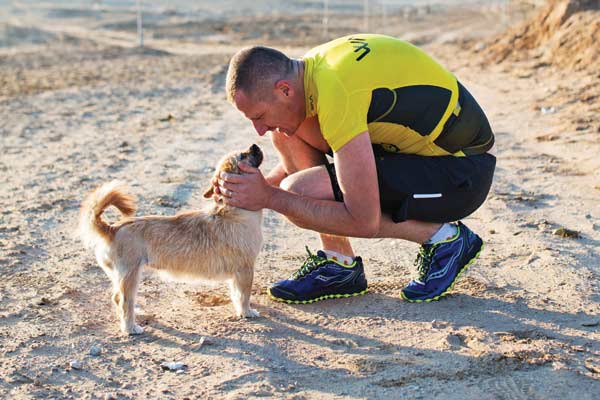Book about stray dog's marathon journey to be published in Mandarin
 |
|
Dion Leonard and Gobi, the stray that joined him on 124 km of an ultramarathon through the Gobi Desert. [Photo/China Daily] |
Ultramarathon runner Dion Leonard said writing Finding Gobi was one of the hardest things he has ever done, "but being found by her, that was one of the best".
Finding Gobi, the international bestseller about a stray dog that joined Leonard and ran 124 kilometers of an ultramarathon through China's Gobi Desert, is to be translated into Mandarin and published in China in March.
"It's a Chinese story, so it's only right that it's available to people over there as well," Leonard said from the foot of Arthur's Seat, an extinct volcano that overlooks Edinburgh, Scotland, where Leonard-and now Gobi-live.
"Without the Chinese people, we would never have found Gobi," he said. "They have been so incredibly supportive and generous."
The book documents Gobi's epic run through the wilderness, the social media campaign launched when Gobi went missing in China, and her journey to Edinburgh where she was reunited with Leonard. It also relays how Leonard's unlikely friendship with the stray dog helped him make peace with the demons of a troubled childhood.
Since its release in English through HarperCollins in June this year, Finding Gobi has entered the bestseller list in the United Kingdom, the United States, Canada, New Zealand, and Leonard's native Australia.
A version for young adults and a children's picture book are also in print, and US studio 20th Century Fox is due to release a film inspired by the story in 2019.
Publisher China Industry & Commerce Associated Press will release traditional and simplified Chinese translations next year-fittingly the Year of the Dog.
Leonard adopted the tiny, sandy-colored female dog in 2016 after she started running alongside him during the second day of the seven-day 250-kilometer ultramarathon through the Gobi Desert.
Multi-stage ultramarathons are brutal mental and physical challenges and the race in China involved a little less than a marathon a day for four days, then almost two marathons on the fifth day, and an hour-long sprint on the final 10 kilometer stage.
Runners typically lose around a 10th of their bodyweight during such races, and must ward of heat exhaustion while competing in temperatures in excess of 49 C.
"I didn't want to encourage her at all," Leonard said. "I was there to compete and win the race, I wasn't there to look after a little dog. But she chose me. We became good buddies during the week, and I ended up falling in love with her and making a promise to bring her back to the UK and try and give her a better life."
Leonard has finished in the top three several times in multistage ultras, though he relinquished his chances of winning the race when he chose to turn back and help Gobi over several river crossings. In all, Gobi completed around half of the race (Leonard asked organizers to let her ride in the car on some of the competition's hottest days).
Following the race, Leonard left Gobi with a caretaker in Urumqi, in the Xinjiang Uyghur autonomous region.
Back in Edinburgh, he raised thousands of pounds through crowdfunding to pay for the transport, blood tests and quarantine needed to get Gobi relocated to Scotland.
Leonard and Gobi's story received national attention in China when the dog went missing in Urumqi, a city of three million people. Leonard flew out to China to lead the search and, following a campaign on social media and dozens of interviews with Chinese TV stations and newspapers, Gobi was eventually found.
Leonard and Gobi now raise money together for pet shelters in the UK.
"She's gone from stray dog to charitable ambassador," he said.









